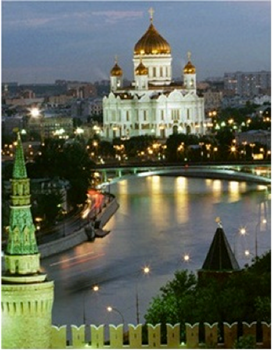About Moscow
 The first recorded reference to Moscow as a town is in an early Russian historical chronicle under the year 1147. The grand Duke of Suzdal Yuriy Dolgorukiy is regarded as a founder of Moscow. Gradually the city became more and more powerful and flourished under the rule of Andrej Bogolubskij, Ivan Kalita ('kalita'-means 'a money bag'), Dmitriy Donskoy, Ivan III, Boris Godunov, Michael Romanov and many others.
The first recorded reference to Moscow as a town is in an early Russian historical chronicle under the year 1147. The grand Duke of Suzdal Yuriy Dolgorukiy is regarded as a founder of Moscow. Gradually the city became more and more powerful and flourished under the rule of Andrej Bogolubskij, Ivan Kalita ('kalita'-means 'a money bag'), Dmitriy Donskoy, Ivan III, Boris Godunov, Michael Romanov and many others.
After Peter the Great became a new Russian tsar many Russian towns were assigned to provinces. The provinces were headed by governors, who faithfully served the Russian State till 1917. The names of many governors are familiar to moscovites up to the present time. Among them: boyar Streshnev, count Chernyshev, prince Volkonskiy, count Rostopchin, prince Golitzyn Ð altogether more than 50. Since 1917 the functions of main officials of local authorities had been realized by chairmen of Executive Committee, recently it is realized by Moscow mayors.
More than half and eight centuries have already gone away. More than once was our city conquered, destroyed and rebuilt. At present Moscow is one of the largest cities in the world. Exceptionally thanks to the favourable location, Moscow gained the advantage over the other Russian cities. From the very beginning territorial development of Moscow was determined by the necessity of durable defence system. Moscow was constantly threatened with the nomadic hordes from the south and east and with Polish-Lithuanian invaders from the west. At this very time famous 'holy fortifications' such as Spaso-Andronnikov and Simonov Monasteries and Novodevichi Convent appeared.
During many years Moscow has been the centre of Russian national culture. The main historical and architectural monuments of world importance such as Kremlin, Novodevichi Convent, Church of Pokrov in Fili, Moscow State University, Triumph Arc and Victory Park on Poklonnaya Hill are concentrated here. Cathedral of Christ the Savior, Resurrection Gate with Iberian chapel and the Church of Our Lady of Kazan in Red Square have been reconstructed. Great bulk of historical monuments is being reconstructed and restored now. By the initiative of Moscow authorities historical and cultural heritage is preserved for the future.
Much is done for comfort of moscovites and guests of Moscow: in the streets more and more pedestrians areas are organized; new modern hotels, cafes and restaurants appear.
Large festivals, olympiadas, sports competitions and different international championships are regulary hold in Moscow. Moscow is famous for its theatres, museums, exhibition halls. Among them are world famous Bolshoj and Malyj theatres, the State Tretyakov Gallery, Pushkin State Museum of Fine Arts, Central Exhibition Hall 'Manege'.
If you have already visited Moscow, you will have the desire to come back again, because Moscow is one of the most beautiful cities in the world.

photo from http://www.photo-moskva.ru